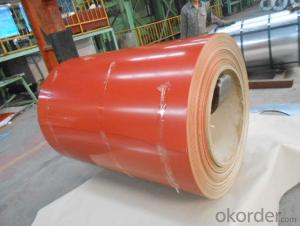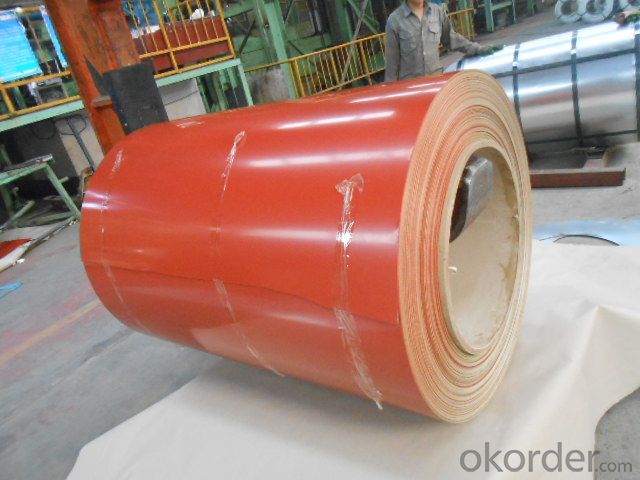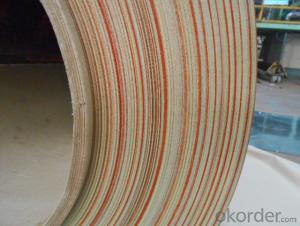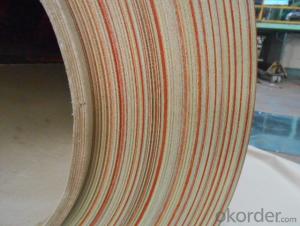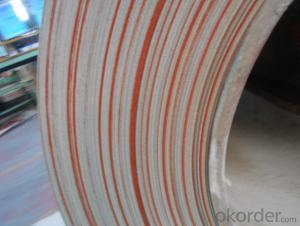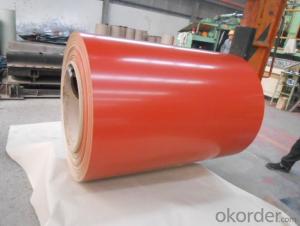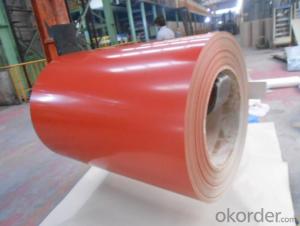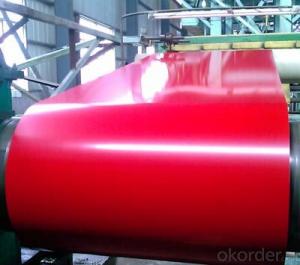Pre-Painted Galvanized Steel Sheet/Coil with Prime Quality Red Color
- Loading Port:
- Shanghai
- Payment Terms:
- TT OR LC
- Min Order Qty:
- 200 m.t.
- Supply Capability:
- 20000 m.t./month
OKorder Service Pledge
OKorder Financial Service
You Might Also Like
1. Pre-Painted Galvanized/Aluzinc Steel Coil Description:
With GI as base material, after pretreatment (degrease and chemical treatment ) and liquid dope with several layers of color, then after firing and cooling, finally the plate steel is called pre-painted galvanized (aluzinc) steel. Pre-painted galvanized steel is good capable of decoration, molding, corrosion resistance. It generally displays superior workability, durability and weather resistance.
2.Main Features of the Pre-Painted Galvanized/Aluzinc Steel Coil:
• Excellent process capability
• Smooth and flat surface
• Workability, durability
• Excellent heat resistance performance
• High strength
• Good formability
• Good visual effect
3.Pre-Painted Galvanized/Aluzinc Steel Coil Images
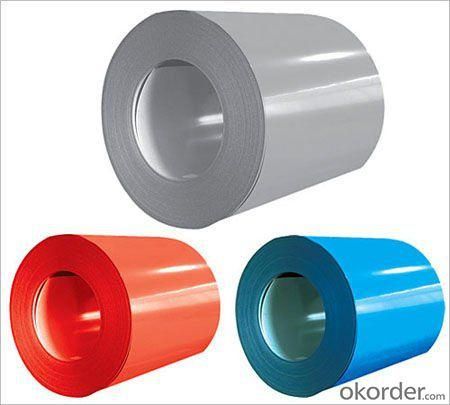
4.Pre-Painted Galvanized/Aluzinc Steel Coil Specification
Standard: AISI, ASTM, BS, DIN, GB, JIS
Grade: DX51D, DX52D
Thickness: 0.17-2.0mm
Brand Name: KMRLON
Model Number: coil
Type: Steel Coil
Technique: Cold Rolled
Surface Treatment: Coated
Application: Boiler Plate
Special Use: High-strength Steel Plate
Width: 20-1250mm
Length: customized
commoidty: pre-painted galvanized steel coil
Thickness: 0.13-4.0mm
width: 20-1250mm
zinc coating: 40-180g/m2
printing thickness: top side: 20+/-5 microns, back side: 5-7 microns
color: all RAL color
surface treatment: color coated
coil weight: 4-7 tons
coil ID: 508/610mm
packaging: standard seaworthy packing
5.FAQ of Pre-Painted Galvanized/Aluzinc Steel Coil
1. What’s the application of this product?
Roof, roof structure, surface sheet of balcony, frame of window, etc.
2. What’s the brand of the paint?
We use the best brand of all of the word—AKZO.
3. How about your company?
A world class manufacturer & supplier of castings forging in carbon steel and alloy steel,is one of the large-scale professional investment casting production bases in China,consisting of both casting foundry forging and machining factory. Annually more than 8000 tons Precision casting and forging parts are exported to markets in Europe,America and Japan. OEM casting and forging service available according to customer’s requirements.
4. How to guarantee the quality of the products?
We have established the international advanced quality management system,every link from raw material to final product we have strict quality test;We resolutely put an end to unqualified products flowing into the market. At the same time, we will provide necessary follow-up service assurance.
5. How long can we receive the product after purchase?
Usually within thirty working days after receiving buyer’s advance payment or LC. We will arrange the factory manufacturing as soon as possible. The cargo readiness usually takes 15-25 days, but the shipment will depend on the vessel situation.
- Q: What are the different types of steel coil grades and specifications?
- There are several different types of steel coil grades and specifications available in the market. These grades and specifications are designed to meet various industry requirements and applications. Some of the commonly used steel coil grades and specifications are: 1. Hot Rolled Steel Coils: These coils are produced by heating the steel above its recrystallization temperature and then rolling it at a high temperature. Hot rolled steel coils are commonly used in applications where dimensional accuracy and surface finish are not critical. 2. Cold Rolled Steel Coils: Cold rolled steel coils are produced by further processing hot rolled coils through cold reduction mills. This process results in improved surface finish, tighter tolerances, and higher strength compared to hot rolled coils. Cold rolled steel coils are widely used in automotive, construction, and electrical industries. 3. Galvanized Steel Coils: Galvanized steel coils are coated with a layer of zinc to protect them from corrosion. This process, known as galvanization, enhances the durability and longevity of the steel coils. Galvanized steel coils are commonly used in applications such as roofing, fencing, and automotive body parts. 4. Stainless Steel Coils: Stainless steel coils are made from a combination of iron, chromium, and other elements that provide excellent corrosion resistance and high strength. These coils are widely used in industries such as food processing, chemical, and medical, where hygiene and corrosion resistance are critical. 5. High-strength Low-alloy (HSLA) Steel Coils: HSLA steel coils are designed to have higher strength and improved formability compared to conventional carbon steels. These coils are commonly used in structural and transportation applications, where weight reduction and high strength are required. 6. Electrical Steel Coils: Electrical steel coils, also known as silicon steel or transformer steel, are specifically designed for use in electrical equipment such as transformers, motors, and generators. These coils have low core losses and high magnetic permeability, making them ideal for efficient energy transfer. 7. Tool Steel Coils: Tool steel coils are specially formulated to have high hardness, wear resistance, and toughness. These coils are commonly used in the manufacturing of cutting tools, dies, and molds. These are just a few examples of the various types of steel coil grades and specifications available in the market. The selection of the appropriate grade and specification depends on the specific application requirements, such as strength, corrosion resistance, formability, and surface finish.
- Q: where to buy Transformer steel?Used in transformers and electric motors.
- Electrical Steel Suppliers
- Q: What are the different types of steel coil surface treatment options?
- There are several types of steel coil surface treatment options, including galvanizing, painting, chromating, and pickling. Galvanizing involves coating the steel with a layer of zinc to protect it from corrosion. Painting involves applying a layer of paint to enhance the appearance and provide additional protection. Chromating is a chemical process that forms a thin layer of chromate on the surface to improve corrosion resistance. Pickling involves removing impurities and scale from the steel surface using an acid solution.
- Q: What are the dimensions of steel coils used in the construction equipment industry?
- The dimensions of steel coils used in the construction equipment industry can vary depending on the specific application and requirements. However, there are common standard dimensions that are often used. Steel coils used in the construction equipment industry typically have a width ranging from 600mm to 2000mm. The thickness of these coils can range from 0.5mm to 25mm or even higher, depending on the intended use and structural requirements. The weight of steel coils used in construction equipment industry can vary significantly, ranging from a few hundred kilograms to several tonnes. The weight is typically determined by the dimensions and thickness of the coil, as well as the specific grade and type of steel being used. It is important to note that these dimensions are not fixed and can be customized based on the specific needs of the construction equipment industry. Manufacturers and suppliers can provide steel coils in various dimensions to meet the specific requirements of construction equipment manufacturers and contractors.
- Q: What is the minimum temperature that steel coils can withstand?
- The minimum temperature that steel coils can withstand depends on the specific grade of steel and its intended application. However, in general, most steel coils can withstand temperatures as low as -40°C (-40°F) without significant damage or structural failure.
- Q: What are the applications of stainless steel coils?
- Stainless steel coils have a wide range of applications due to their durability, corrosion resistance, and versatility. They are commonly used in industries such as automotive, construction, aerospace, and food processing. These coils are used for manufacturing parts, components, and equipment like kitchen appliances, automotive parts, building materials, surgical instruments, and storage tanks. Additionally, they are utilized in heating, ventilation, and air conditioning (HVAC) systems, as well as in electrical and electronic devices.
- Q: Project for school, we're learning about periodic elements and we have to choose an item from our hobbies to research what its made of. Any ideas on steel guitar strings??
- Steel is usually mainly made up of Iron (Fe) element, but it can also include Carbon (C) for a stronger steel or Nickel (Ni) for stainless steel.
- Q: How are steel coils used in the production of metal buildings?
- Steel coils are an essential component in the production of metal buildings as they are used to create the structural framework and outer cladding. These coils are unrolled and cut into sheets, which are then shaped and formed into various building components such as beams, columns, and panels. The strength and durability of steel make it an ideal material for constructing metal buildings, ensuring they are capable of withstanding harsh weather conditions and providing long-lasting structures.
- Q: How are steel coils inspected for width variations?
- Steel coils are typically inspected for width variations using non-contact laser measurement systems. These systems use lasers to scan the entire surface of the coil and measure the distance between the coil edges at regular intervals. This data is then analyzed to detect any variations in width, allowing for timely adjustments and ensuring the desired specifications are met.
- Q: How are steel coils used in the manufacturing of tools?
- Steel coils are often used in the manufacturing of tools as they provide a sturdy and durable material to create various components of the tools. The coils are shaped and cut into specific sizes and shapes to form the tool's body, handles, or blades. This allows for the production of high-quality tools that can withstand heavy use and provide the necessary strength and reliability required for different applications.
Send your message to us
Pre-Painted Galvanized Steel Sheet/Coil with Prime Quality Red Color
- Loading Port:
- Shanghai
- Payment Terms:
- TT OR LC
- Min Order Qty:
- 200 m.t.
- Supply Capability:
- 20000 m.t./month
OKorder Service Pledge
OKorder Financial Service
Similar products
Hot products
Hot Searches
Related keywords
